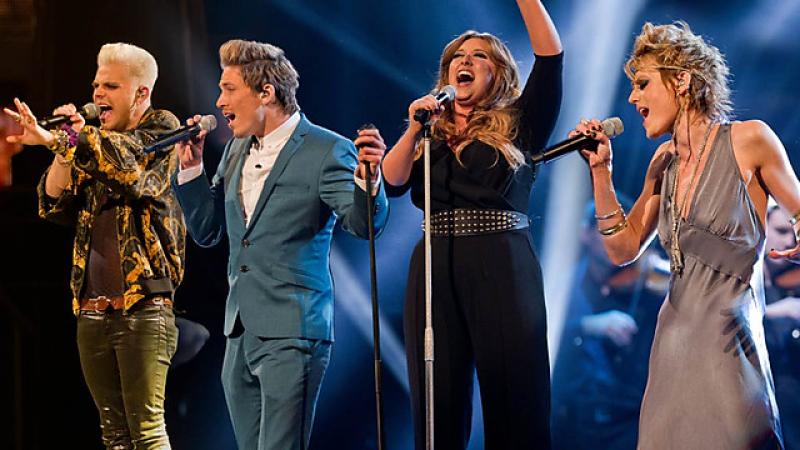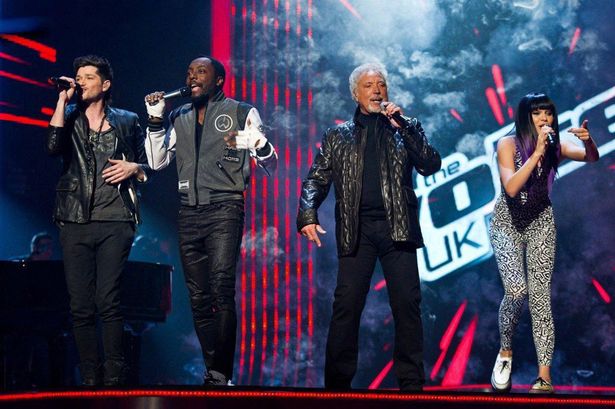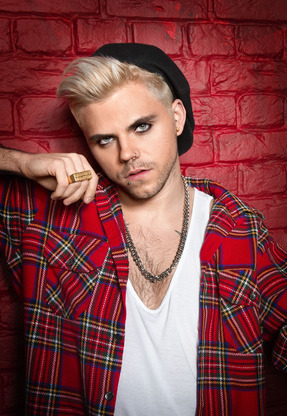The Voice: The Final, BBC One | reviews, news & interviews
The Voice: The Final, BBC One
The Voice: The Final, BBC One
Showcasing BBC awkwardness at its very best

I love the BBC. “Auntie Beeb” really is the appropriate nickname for the Corporation, at least when it comes to television, because you just know when they try and get involved with any kind of pop culture it's going to be with all the gaucheness of a very enthusiastic auntie trying to adopt kids' tastes. This goes double with Danny Cohen – a man who gives the impression that he starts every sentence with “hey guys” and thinks “mega” is the latest street slang – at the helm of BBC One.
The series finished last night with holiday-camp shouter Leanne Mitchell victorious over a jazz weasel, an Essex monkey-goblin and the obligatory kookie girl in the final, but really the competition long since ceased to be the point. An attempt to give the talent show bandwagon a public service broadcasting paint job, the bought-in format has pulled out all the stops to convince us that it's about Real Music and Real Talents and Escaping The Hype, and absolutely isn't the circus that ITV's Simon Cowell shows have become. Of course, though, the harder it tries, the more of a circus it becomes.
 For all the relentlessly hammered-home talk about it being About The Music, it is of course all about sob stories, the funny-looking contestants, the gossip, and most of all the celebrity judges. Sir Tom Jones, a man who exudes what must pass for dignity and down-to-earthness if you've spent half your life in Las Vegas. Some Irish guy from The Script, whose constant attempts at raw, rock'n'roll sincerity are as bland as his band's songs. Jessie J, the rather barmy Essex girl whose clear love of music rather has the dampeners put on it by the fact her own records are almost all the epitome of designed-by-committee blah. And will.i.am – a small, mischievous cat inhabiting the body of a batshit mental pop star.
For all the relentlessly hammered-home talk about it being About The Music, it is of course all about sob stories, the funny-looking contestants, the gossip, and most of all the celebrity judges. Sir Tom Jones, a man who exudes what must pass for dignity and down-to-earthness if you've spent half your life in Las Vegas. Some Irish guy from The Script, whose constant attempts at raw, rock'n'roll sincerity are as bland as his band's songs. Jessie J, the rather barmy Essex girl whose clear love of music rather has the dampeners put on it by the fact her own records are almost all the epitome of designed-by-committee blah. And will.i.am – a small, mischievous cat inhabiting the body of a batshit mental pop star.
On the final, a palpable relief that the nonsense would all soon be over created a generally genial atmosphere, so there was much less of the barely controlled bickering and gritted teeth as they tried to hold on to the relentless positivity which the show's ethos demands. But again and again, as they explained what great friends they were with all the contestants, as they clunkily performed one another's songs onstage (pictured above), and as they tried to stay on-brand and explain why The Voice was different from and more real than “other shows”, their egos knocked together like cannonballs in a cement-mixer.
continued...
 As for the music, it was a sideshow. Only one finalist – in fact, one contestant in the whole series – really stood out: the monkey-goblin Vince Kidd (pictured left), who came fourth. A kaleidoscopically striking, racially and sexually ambiguous pop fanatic with a voice somewhere between Boy George and Justin Timberlake, he represented everything that is ridiculous and brilliant about pop. Like Misha B from last year's X Factor, he suggests the possibility of the auteur pop star, informed by culture clash rather than lowest-common-denominator fusion, is still very real. I sincerely hope he does well for himself – partly because the music may be great, but also because he may burst if he doesn't become really famous soon.
As for the music, it was a sideshow. Only one finalist – in fact, one contestant in the whole series – really stood out: the monkey-goblin Vince Kidd (pictured left), who came fourth. A kaleidoscopically striking, racially and sexually ambiguous pop fanatic with a voice somewhere between Boy George and Justin Timberlake, he represented everything that is ridiculous and brilliant about pop. Like Misha B from last year's X Factor, he suggests the possibility of the auteur pop star, informed by culture clash rather than lowest-common-denominator fusion, is still very real. I sincerely hope he does well for himself – partly because the music may be great, but also because he may burst if he doesn't become really famous soon.
Leanne will be fine: she seems like a nice girl and she'll probably be starring in Chicago within two years. Tyler James, the jazz weasel with Jedward hair who seemed unable to do anything but moany versions of mid-Eighties yuppie soul (Terence Trent D'Arby, Steve Winwood), may well sell some albums. As for Bo Bruce, well, if the world needs another slightly flat singer somewhere between Coldplay and The Cranberries to get its emotional stimulation, we're in a bad way indeed. Some other singers in the series will get jobs out of The Voice, I'm sure. But that wasn't what it was about: the whole thing was about great British awkwardness, embarrassment and passive-aggression, and as such deflated the whole format in the most agreeable way. We're guaranteed another series as Cohen chucked £11m of our license money per year on this with a two-year contract; let's hope it stays as stupidly, faux-sincerely entertaining next year.
Add comment
The future of Arts Journalism
You can stop theartsdesk.com closing!
We urgently need financing to survive. Our fundraising drive has thus far raised £49,000 but we need to reach £100,000 or we will be forced to close. Please contribute here: https://gofund.me/c3f6033d
And if you can forward this information to anyone who might assist, we’d be grateful.

Subscribe to theartsdesk.com
Thank you for continuing to read our work on theartsdesk.com. For unlimited access to every article in its entirety, including our archive of more than 15,000 pieces, we're asking for £5 per month or £40 per year. We feel it's a very good deal, and hope you do too.
To take a subscription now simply click here.
And if you're looking for that extra gift for a friend or family member, why not treat them to a theartsdesk.com gift subscription?

Comments
I saw it for the first time
Is that £11m just for this
Thanks Uschi, completely
Thanks Uschi, completely correct about the cost being per year, have corrected.
Personally I think terrestrial TV's approach to music is crippled by a set of awful self-fulfilling prophecies - see: Black Cab Sessions: music TV catches up with the net?
pathetic programme.
An excellent assessment. I
Thanks! And you're right, I
Thanks! And you're right, I should've mentioned Ruth, but that would have been a whole other paragraph or two and it was late and I was tired. She was great, untrained but great, but I wasn't surprised when the Whitney/Beyonce-styled OTT vocal acrobatics of Leanne got chosen over her from-the-heart holler. I definitely don't think, as some have suggested, it was racism on the part of the British public, just the way taste is sliced. Likewise Jazz, who was held up as some amazing "real musician" didn't get through because he was out-and-out BORING. I think the music does actually matter to viewers, as I said in my season finale review of X Factor last year, these shows wouldn't exist if there wasn't the desire to see real performance on prime time TV... but expecting the BBC to create the right platform to meet that desire is like expecting your straightest Auntie to do a crowd-slaying set at a Rinse rave at Fabric.